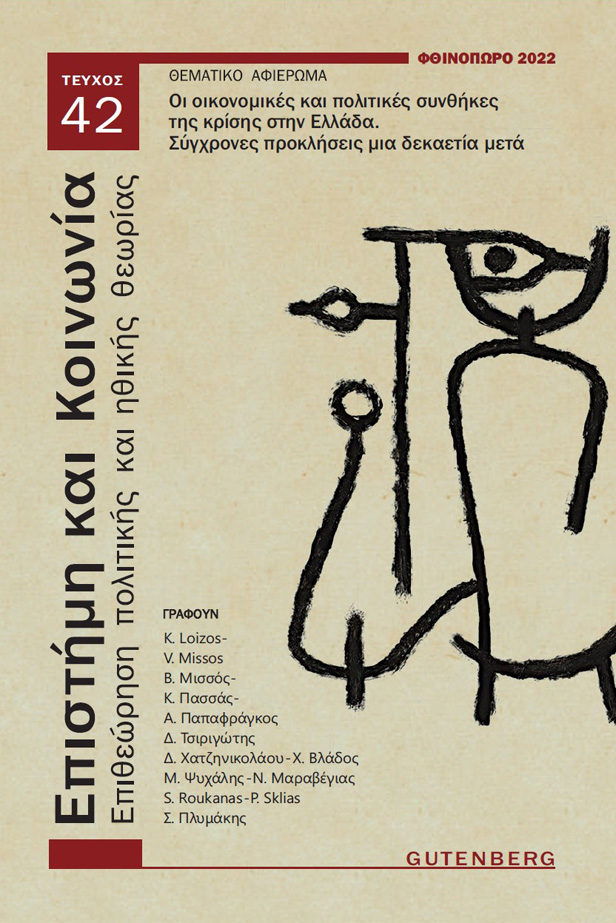Ο Κατώτατος μισθός στην Ελλάδα της κρίσης. Κριτική επισκόπηση της σύγχρονης θεωρίας και πολιτικής
Περίληψη
Η μεταστροφή της διεθνούς νεοφιλελεύθερης ρητορείας προς μία περισσότερο δεκτική στάση στη θεσμοθέτηση ενός πλαισίου τακτικών αναπροσαρμογών του κατώτατου μισθού, προέκυψε στον απόηχο της ανεπαρκούς εμπειρικής τεκμηρίωσης των συμπερασμάτων της κυρίαρχης οικονομικής θεωρίας. Επί δεκαετίες, η επικρατούσα οικονομική πολιτική υπογράμμιζε τον κίνδυνο μειωμένης απασχόλησης ως συνέπεια των μισθολογικών αυξήσεων, η οποία μεσοπρόθεσμα, θα οδηγούσε στην όξυνση της ανισότητας και φτώχειας. Το παρόν άρθρο υποστηρίζει ότι η συγκεκριμένη μεταβολή δεν συνιστά απόκλιση από την προηγούμενη ιδεολογική στάση, επισημαίνοντας ότι η συζήτηση για τον κατώτατο μισθό στην Ελλάδα παραμένει εξαιρετικά αναχρονιστική και δύσκαμπτη. Παράλληλα, το άρθρο εξετάζει την επίδραση της αύξησης του κατώτατου μισθού, το 2019, στην ανισότητα των μισθωτών, υπογραμμίζοντας τη σημασία του στην προαγωγή κοινωνικής ευημερίας. Στη συνέχεια επικεντρώνεται στην εμπειρική εξέταση της μακροχρόνιας σχέσης των δύο μεγεθών στην Ελλάδα, με περίοδο αναφοράς τα έτη 1995 έως 2019. Συμπερασματικά, η επιμονή στη μείωση του κατώτατου μισθού με πρόσχημα την διατήρηση του επιπέδου συνολικής απασχόλησης, η οποία εντάθηκε με την εφαρμογή των Προγραμμάτων Οικονομικής Προσαρμογής από το 2012 και ύστερα, δεν επιβεβαιώνεται ούτε βιβλιογραφικά, αλλά ούτε και από τα εμπειρικά δεδομένα.
Λεπτομέρειες άρθρου
- Πώς να δημιουργήσετε Αναφορές
-
Μισσός Β., Πασσάς Κ., & Παπαφράγκος Α. (2022). Ο Κατώτατος μισθός στην Ελλάδα της κρίσης. Κριτική επισκόπηση της σύγχρονης θεωρίας και πολιτικής. Επιστήμη και Κοινωνία: Επιθεώρηση Πολιτικής και Ηθικής Θεωρίας, 42, 55–89. ανακτήθηκε από https://ejournals.epublishing.ekt.gr/index.php/sas/article/view/29535
- Ενότητα
- Άρθρα

Αυτή η εργασία είναι αδειοδοτημένη υπό το CC Αναφορά Δημιουργού – Μη Εμπορική Χρήση – Παρόμοια Διανομή 4.0.
Οι Συγγραφείς που δημοσιεύουν εργασίες τους σε αυτό το περιοδικό συμφωνούν στους παρακάτω όρους:- Οι Συγγραφείς διατηρούν τα Πνευματικά Δικαιώματα και χορηγούν στο περιοδικό το δικαίωμα της πρώτης δημοσίευσης ενώ ταυτόχρονα τα πνευματικά δικαιώματα της εργασίας προστατεύονται σύμφωνα με την άδεια Creative Commons Αναφορά Δημιουργού - Μη Εμπορική Χρήση - Παρόμοια Διανομή 4.0 Διεθνές , που επιτρέπει σε τρίτους - αποδέκτες της άδειας να χρησιμοποιούν την εργασία όχι για εμπορικούς σκοπούς, με την προϋπόθεση της διατήρησης των διατυπώσεων που προβλέπονται στην άδεια σχετικά με την αναφορά στον αρχικό δημιουργό και την αρχική δημοσίευση σε αυτό το περιοδικό και με διανομή τυχόν τροποποιήσεων υπό την ίδια άδεια όπως και το πρωτότυπο.
- Οι Συγγραφείς μπορούν να συνάπτουν ξεχωριστές, και πρόσθετες συμβάσεις και συμφωνίες για την μη αποκλειστική διανομή της εργασίας όπως δημοσιεύτηκε στο περιοδικό αυτό (π.χ. κατάθεση σε ένα ακαδημαϊκό καταθετήριο ή δημοσίευση σε ένα βιβλίο), με την προϋπόθεση της αναγνώρισης και την αναφοράς της πρώτης δημοσίευσης σε αυτό το περιοδικό.
- Το περιοδικό επιτρέπει και ενθαρρύνει τους Συγγραφείς να καταθέτουν τις εργασίες τους μέσω διαδικτύου (π.χ. σε ένα ακαδημαϊκό καταθετήριο ή στους προσωπικές τους ιστοσελίδες) πριν και μετά από τις διαδικασίες της δημοσίευσης, καθώς αυτό μπορεί να οδηγήσει σε παραγωγική ανταλλαγή ιδεών και σκέψεων καθώς επίσης και σε γρηγορότερη και μεγαλύτερη χρήση και ευρετηρίαση της δημοσιευμένης εργασίας (See The Effect of Open Access).



